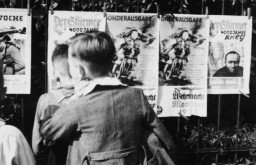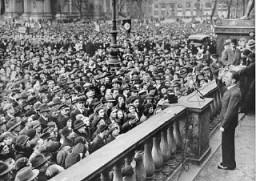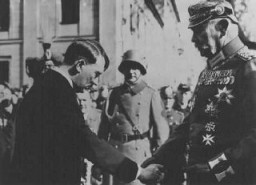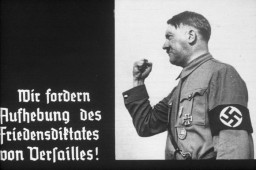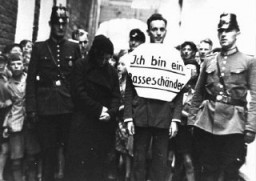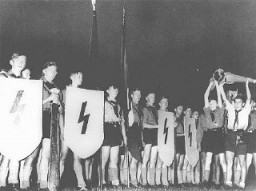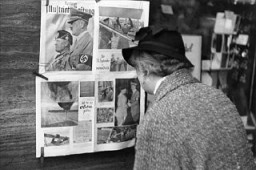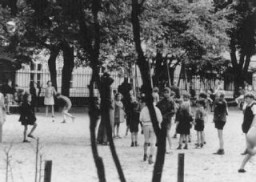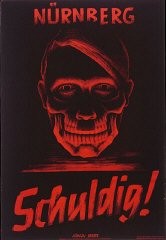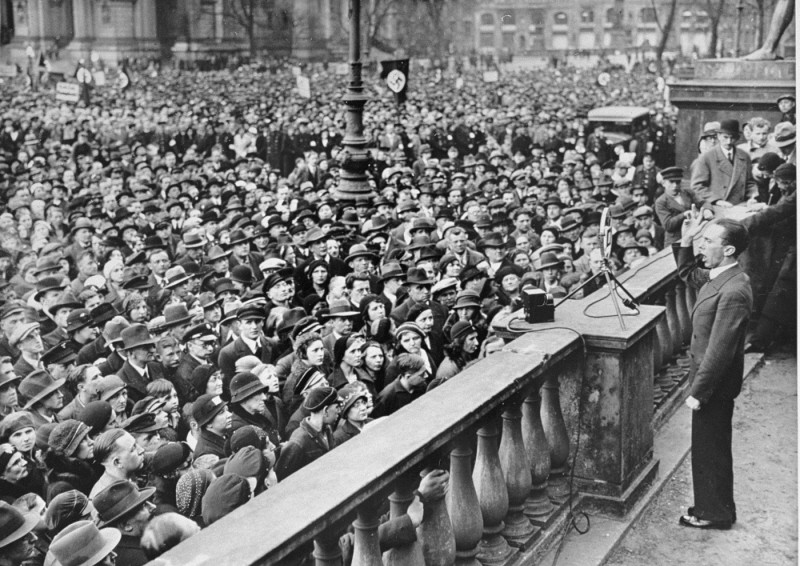
Ministry of Propaganda and Public Enlightenment
In the days after the Nazi electoral victories of July 1932, Adolf Hitler informed Joseph Goebbels that he intended to make Goebbels director of a new propaganda ministry when the Nazis took over the reins of national government. Goebbels soon envisioned an empire that would control schools, universities, film, radio, and propaganda. “The national education of the German people,” he wrote, “will be placed in my hands.”
Creating a Propaganda Ministry
Creating a Propaganda Ministry was a novel idea for a country at peace. Governmental propaganda organizations had tended to be temporary committees necessitated by war or disguised as ministries of information. Indeed, Goebbels initially opposed the term propaganda, recognizing that in popular usage, both in Germany and abroad, it was associated with lies.
Even after the ministry had been in existence for a year, he proposed changing its name to Ministry of Culture and Public Enlightenment, but Hitler vetoed this proposal. In addition, in keeping with his governing style of establishing ministries with overlapping responsibilities, Hitler retained propaganda offices that fell under others’ control, including those of the ministries of Foreign Affairs and of Education. Even in the realm of culture and the arts, Goebbels’s authority was far from absolute; Hitler, Nazi leader Hermann Göring, ideologue Alfred Rosenberg, and others created their own separate areas.
Control of Film, Radio, Theater, and the Press
Still, Goebbels wielded enormous influence. Film, radio, theater, and the press largely fell under Goebbels’s jurisdiction (though he shared power over the press with the head of the Reich Press Chamber, Max Amann, the Nazi newspaper magnate, and after 1937 with Otto Dietrich, head of the Reich Press Office). Goebbels also continued as head of the party’s propaganda apparatus that reached down to the local Nazi organizations. At the age of thirty-five, the youngest minister in the new cabinet, Goebbels became indispensable to the regime and to Adolf Hitler.
The Propaganda Ministry, through the Reich Press Chamber, assumed control over the Reich Association of the German Press, the guild that regulated entry into the profession. Under the new Editors Law of October 4, 1933, the association kept registries of “racially pure” editors and journalists, thus excluding Jews and those married to Jews from the profession.
Editors and journalists were expected to follow the mandates and instructions handed down by the ministry and had to be registered with the Reich Press Chamber to work in this field. Clause 14 of the law ordered editors to omit anything “calculated to weaken the strength of the Reich abroad or at home.” The Propaganda Ministry aimed further to control the content of news and editorial pages through directives distributed in daily conferences in Berlin and transmitted through the party propaganda offices to regional or local papers. Detailed guidelines stated what stories could or could not be reported and how to report the news.
Journalists or editors who failed to follow these instructions could be fired or sent to a concentration camp. Reflecting in his diary on the press’s loss of independence, Goebbels, a one-time journalist, wrote: “Any man who still has a residue of honor will be very careful not to become a journalist.”
Within months of Hitler becoming chancellor, the Nazi regime destroyed the country’s free press. It shut down hundreds of opposition newspapers, forcibly transferred Jewish-owned publishing houses to “Aryans,” and secretly took over established periodicals. Daily directives from the Propaganda Ministry’s Press Division dictated what could or what could not be published under punishment of reprimand, loss of position, or imprisonment. Oversight of radio, film, newsreels, theater, and music fell directly to the Propaganda Ministry, which used a combination of these media to sell Nazi ideology.
Critical Thinking Questions
- Is there a direct link between words and actions? Can words and images inspire people to commit acts of genocide?
- How can knowledge of the events in Germany and Europe before the Nazis came to power help citizens today respond to threats of genocide and mass atrocity in the world?
